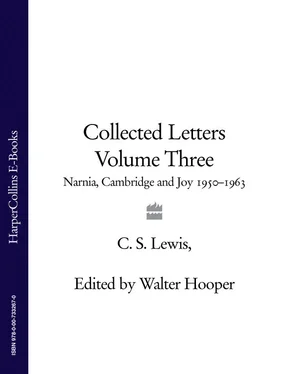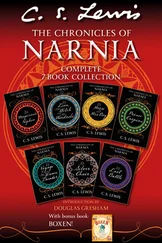181George Bernard Shaw, The Doctor’s Dilemma (1906).
182See Ruth Pitterin the Biographical Appendix to CL II, pp. 1060-4.
*But fan mail from children is delightful. They don’t gas. They want to know whether Asian repaired Tumnus’s furniture for him. They take no interest in oneself and all in the story. Lovely
183 The Case for Christianity (New York: Macmillan, 1943) was the American edition of Broadcast Talks .
184 Beyond Personality (London: Bles, 1944; New York: Macmillan, 1945).
185J. B. Phillips, Letters to Young Churches: A Translation of the New Testament Epistles (1947). See Lewis’s letter to Phillips of 3 August 1943 ( CL II, pp. 585-6).
186Mark Twain, The Adventures of Tom Sawyer (1876); The Adventures of Huckleberry Finn (1884).
187William Shakespeare, King Henry V (1600), IV, iii, 55.
188Luke 22:19; 1 Corinthians 11:24.
189John 6:53.
190i.e., in the Book of Common Prayer .
1911 Corinthians 12:12: ‘For as the body is one, and hath many members, and all the members of that one body, being many, are one body: so also is Christ.’
192Mark 16:17-18: ‘These signs shall follow them that believe; In my name…they shall lay hands on the sick, and they shall recover.’
193See Sheldon Vanaukenin the Biographical Appendix. Vanauken’s ‘Notes on the Letters’ are in the Bodleian Library (MS. Eng. lett. c. 220/2, fols. 152b-c).
194Sheldon Vanauken, A Severe Mercy (London: Hodder & Stoughton, 1977), ch. 2, p. 38.
195ibid., ch. 4, pp. 87-8.
196G. K. Chesterton, The Everlasting Man (1925).
197Lewis uses the Chinese word ‘Tao’ in The Abolition of Man to mean natural law or morality.
198The Rev. R. B. Gribbon, a relative of Arthur Greeves, was writing from Ballinderry Road, Easton, Maryland, USA.
199i.e., The Lion, the Witch and the Wardrobe .
200Rudyard Kipling, The Seven Seas (1896), ‘McAndrew’s Hymn’, II, 17-18: ‘Hail, snow an’ ice that praise the Lord: I’ve met them at their work,/An’ wished we had anither route or they anither kirk.’
201In his second letter to Lewis, Vanauken said: ‘My fundamental dilemma is this: I can’t believe in Christ unless I have faith, but I can’t have faith unless I believe in Christ…Everyone seems to say: “You must have faith to believe.” Where do I get it? Or will you tell me something different? Is there a proof? Can Reason carry me over the gulf…without faith? Why does God expect so much of us?…If He made it clear that He is—as clear as a sunrise or a rock or a baby’s cry—wouldn’t we be right joyous to choose Him and His Law?’ (Vanauken, A Severe Mercy , ch. 4, pp. 90-1)
202The Eleatic school of philosophers was founded by the Greek poet Xenophanes (born c. 570 BC), whose main teaching was that the universe is singular, eternal and unchanging. According to this view, as developed by later members of the Eleatic school, the appearances of multiplicity, change and motion are mere illusions.
203William Shakespeare, Othello, The Moor of Venice (1622).
204William Shakespeare, King Lear (1608).
205Alexander Pope, An Essay on Criticism (1711), II, 2.
206Luke 10:7.
207This note was added in Lewis’s hand.
208‘Let us pray for one another’.
209‘the beard of corn’.
210Abul Kasim Mansur Firdausi (c. 950-1020), Persian poet, is the author of Shah-natneh . Considered the greatest national epic in world literature, the poem consists of 60,000 couplets. When the work was presented to the Sultan, he rewarded Firdausi with a pitiful amount of money. The disappointed Firdausi gave the money to a bath attendant and left for Afghanistan. Lewis regretted he could not read Persian, but in his poem ‘The Prodigality of Firdausi’, published in Punch , 215 (1 December 1948), p. 510, and reprinted in Poems and CP , he extols ‘Firdausi the strong Lion among poets’ and tells how handsomely he behaved at the hands of the Sultan.
211Dorothy Wellesley, Duchess of Wellington (1889-1956), whose collected poems were published as Early Light (1955).
212Sayer had asked if Pauline Baynes should illustrate all the Narnian stories. See Pauline Diana Baynesin the Biographical Appendix to CL II, pp. 1018-22.
213Sir Thomas Browne, Religio Medici (1643), II, x: ‘Great virtues and vices no less great’.
TO MARY VAN DEUSEN (W):
Magdalen College
Oxford
Jan 5/51
Dear Mrs. Van Deusen
Whether any individual Christian who attempts Faith Healing is prompted by genuine faith and charity or by spiritual pride is, I take it, a question we cannot decide. That is between God and him. Whether the cure occurs in any given case is clearly a question for the doctors. I am speaking now of healing by some act , such as anointing or laying on of hands. Praying for the sick—i.e. praying simply, without any overt act is unquestionably right and indeed we are commanded to pray for all men. 1 And of course your prayers can do real good.
Needless to say, they don’t do it either as a medicine does or as magic is supposed to do: i.e. automatically. Prayer is Request—like asking your employer for a holiday or asking a girl to marry one. God is free to grant the request or not: and if He does you cannot prove scientifically that the thing wd. not have happened anyway. Just as the boss might (for all you know) have given you a holiday even if you hadn’t asked. (Cynical people of my sex will tell one that if a girl has determined to marry you, married you wd. have been whether you asked her or not!). Thus one can’t establish the efficacy of prayer by statistics as you might establish the connection between pure milk and fewer cases of tuberculosis. It remains a matter of faith and of God’s personal action: it would become a matter of demonstration only if it were impersonal or mechanical. 2
When I say ‘personal’ I do not mean private or individual. All our prayers are united with Christ’s perpetual prayer and are part of the Church’s prayer. (In praying for people one dislikes I find it v. helpful to remember that one is joining in His prayer for them.)
With all best wishes for the New Year.
Yours sincerely
C. S. Lewis
TO SHELDON VANAUKEN (BOD): 3
Magdalen College
Oxford
Jan 5/51
Dear Mr. Van Auken
We must ask three questions about the probable effect of changing your research subject to something more theological.
(1.) Wd. it be better for your immediate enjoyment? Answer, probably but not certainly, Yes.
(2.) Wd. it be better for your academic career? Answer, probably No. You wd. have to make up in haste a lot of knowledge which cd. not be v. easily digested in the time.
(3.) Wd. it be better for your soul? I don’t know. I think there is a great deal to be said for having one’s deepest spiritual interest distinct from one’s ordinary duty as a student or professional man.
St Paul’s job was tent-making. When the two coincide I shd. have thought there was a danger lest the natural interest in one’s job and the pleasures of gratified ambition might be mistaken for spiritual progress and spiritual consolation: and I think clergymen sometimes fall into this trap.
Contrariwise, there is the danger that what is boring or repellent in the job may alienate one from the spiritual life. And finally someone has said ‘None are so unholy as those whose hands are cauterised with holy things’: 4 sacred things may become profane by becoming matters of the job. You now want truth for her own sake: how will it be when the same truth is also needed for an effective footnote in your thesis? In fact, the change might do good or harm. I’ve always been glad myself that Theology is not the thing I earn my living by. On the whole, I’d advise you to get on with your tent-making. The performance of a duty will probably teach you quite as much about God as academic Theology wd. do. Mind, I’m not certain: but that is the view I incline to.
Читать дальше












